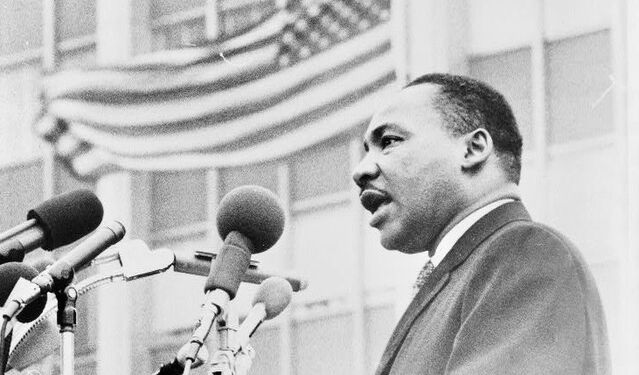Race and Ethnicity
Justice, Nationalism, Christianity, and Race
How views on race may help explain differing perspectives among Christians.
Posted January 17, 2022 Reviewed by Devon Frye
Key points
- Should we prioritize our country's needs when other countries have greater needs?
- Certain Christian leaders, like Dr. Martin Luther King Jr., seem to have taken a side, according to recorded statements.
- Some Christians may disagree with those views; evidence suggests this may be due in part to differing views about race.

At an event about the legacy of Dr. King this morning, I found myself wondering what we can do about injustice. Compared to the needs in many parts of the world, the needs in my own country seem less urgent and severe. Moreover, there are times when giving our time, energy, and money to one cause means giving less to another cause. Even though we care about both of those needs, scarcity sometimes requires us to choose between them. This can lead to a sort of nationalist vs. globalist dilemma. Should we prioritize the needs of our country over the greater needs of other countries?
There are many perspectives on such dilemmas. Today, I want to focus on a perspective from Dr. Martin Luther King Jr. and some of Dr. King's fellow Christians. After all, Dr. King expressed views about nationalism, but despite Dr. King's enormous influence, some Christians in the U.S. seem to have adopted a different view. Some studies suggest that this seeming disagreement between Christians may be related to their different views about race.
Nationalism vs. More Inclusive Perspectives
Effective altruists often focus more on the most severe needs that can be most effectively ameliorated, even if that means focusing resources on the needs of other countries (e.g., Singer, 1972). However, many people in wealthy countries prioritize their time, energy, and money on more local needs, even if those needs are less severe than the needs of those abroad.
Dr. Martin Luther King’s values seemed fairly universal, applying to all of humanity, not just those in nearby or relatively well-off countries. However, Dr. King's legacy is often discussed within the context of his own country: the United States. These two observations lead to a question: When faced with a dilemma between the needs of one's own country and greater needs abroad, would Dr. King have favored a more nationalist approach or a more globalist approach?
A Word from Dr. King
Our age is one in which men have turned away from the eternal God of the universe, and decided to worship at the shrine of the god of nationalism.
[...] This new religion has its familiar prophets and preachers. In Germany it was preached by Hitler. In Italy it was preached by Mussolini. And in America it is being preached by the McCarthys and the Jenners, the advocators of white supremacy, and the America First movements. [...]
One cannot worship this false god of nationalism and the God of Christianity at the same time. (King, 1953)
These statements seem fairly clear. When it comes to dilemmas between spending limited resources on needs within our country versus the greater needs of another country, Dr. King explicitly rejects the nationalist approach to this dilemma in favor of a more expansive approach. In fact, Dr. King makes this even more explicit later, a few sentences after the quoted passage above: "Nationalism must give way to internationalism" (ibid.). Curiously, Dr. King's motivations are not purely political; they are largely religious.
Christianity, Nationalism, and Race
Dr. King is among the most revered U.S. Christian leaders of the 20th century, and Dr. King rejected nationalism in favor of a broader perspective. However, many Christians in the U.S. have adopted nationalist beliefs or tendencies (Perry, Whitehead, & Grubbs, 2020). Why?
It may have to do with different views of—among other things—race. For example, among 816 White adults in the U.S., "Christian nationalism [wa]s powerfully associated with refusing to acknowledge anti-Black discrimination while affirming supposed anti-White discrimination" (Perry et al., 2021). And these views about race could have major implications for society: The more that people identified as White and as victims, the more their Christian nationalism correlated with support for political violence and the belief that the January 6 "Capitol riot" was justified (Armaly, Buckley, and Enders, 2022).
In other words, not all Christian faith in the U.S. is equal. Some Christians who identify as White and feel victimized may be less likely to buy into Dr. King's views and motivations, whether it is about nationalism or racial injustice. This divergence in views about race may be part of the explanation about why one of the most prominent Christian leader's views about justice have not been adopted by more Christians in the U.S.
References
Armaly, M. T., Buckley, D. T., & Enders, A. M. (2022). Christian Nationalism and Political Violence: Victimhood, Racial Identity, Conspiracy, and Support for the Capitol Attacks. Political Behavior. https://doi.org/10.1007/s11109-021-09758-y
King, M. L. J. (1953). False Gods We Worship. The Martin Luther King, Jr., Research and Education Institute. https://kinginstitute.stanford.edu/king-papers/documents/false-gods-we-…
Perry, S. L., Cobb, R. J., Whitehead, A. L., & Grubbs, J. B. (2021). Divided by Faith (in Christian America): Christian Nationalism, Race, and Divergent Perceptions of Racial Injustice. Social Forces, soab134. https://doi.org/10.1093/sf/soab134
Perry, S. L., Whitehead, A. L., & Grubbs, J. B. (2020). Save the Economy, Liberty, and Yourself: Christian Nationalism and Americans’ Views on Government COVID-19 Restrictions. Sociology of Religion, sraa047. https://doi.org/10.1093/socrel/sraa047
Singer, P. (1972). Famine, Affluence, and Morality. Philosophy & Public Affairs, 1(3), 229–243. jstor.org/stable/2265052


